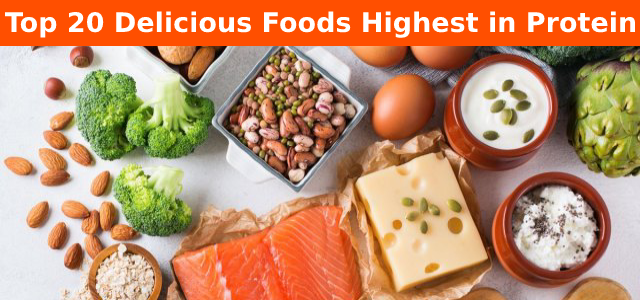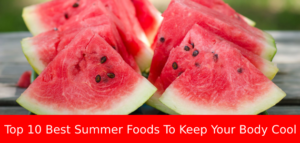
Remember by hearing the sentence from our old school books ‘ Proteins are the building blocks of the human body’? And what we all imagined was a human body constructed by bricks, LOL, like a 3 storeyed building.
It’s just simple. Apart from water, protein constitutes the major source of the nutrient in our body. Protein helps in the growth and maintenance of your bones and muscles.
What is the common problem faced by most of us here? The answer would be so obvious, yes obesity and hair loss.
Reports by several medical centers reveal obesity ranks within the top 3 common health issues faced by the world public.
And what would be your reaction if I say one secret ingredient to your diet, which solves both of your major problems?
Yup, it’s the PROTEIN to your everyday diet that helps in reducing your body and belly fat, building your muscle mass and strength, preventing hair fall, balancing your hormones, and so on.
TOP 20 Delicious High Protein Foods to Eat:
20. Peanuts
Peanuts possess all essential vitamins, minerals, carbohydrates, fats, and proteins. Studies advise that an appropriate intake of peanuts every day may help in reducing weight, improving your skin texture, and also reducing the risk of heart-related diseases.
1 ounce of peanuts (approx. 28g= 28 peanuts) constitutes 7.3 grams of protein.
19. Brussel sprouts
Brussel sprouts are the tiny green cabbage-like balls which are a protein-rich and low-calorie staple during Christmas and Thanksgiving dinner.
Other than providing high quantities of protein, these sprouts also help in building immunity, vision, reducing diabetes, and preventing cancer.
Brussel sprouts can be taken either cooked or uncooked. Studies show that for 100g of Brussel sprouts
- If frozen, and unprepared contains 3.78g of protein
- If frozen and cooked contains 3.64g of protein and
- If cooked without salt contains 2.55g of protein
18. Shrimp
Shrimp is a low-fat low-calorie food but rich in proteins. Shrimp provides essential amino acids of protein that the human body cannot synthesize.
For food energy (KK/100g) of two popular categories of shrimp and their protein composition
- Black Tiger Shrimp- 78.8g
- Indian White Shrimp- 76.4g
17. Fish
Fish is the most common and popular seafood which has enormous amounts of health benefits. ‘’ Fish proteins help a lot in the health of obese people’ says Norwegian researchers.
Depending upon the type of fish, the protein per 100g varies from 62.82g to 22.15g.
The highest protein content is found in Atlantic codfish.
16. Turkey Breast
Naturally, turkey breast meat is one of the highest protein sources… Turkey breast meat decreases the risk of colon cancer, prevents anemia, and promotes muscle retention.
Approximately, 100g of cooked turkey breast contains 28g of proteins
15. Pumpkin seeds
Pumpkin seeds are a plant-based protein diet that reduces the risk of heart disease. Apart from protein, the edible pumpkin seeds are rich in unsaturated fatty acids, vitamins, and minerals like zinc and magnesium.
100g of pumpkin seeds possess 19g of proteins.
14. Ezekiel bread
Unlike other common bread available in the market, Ezekial bread has many more health benefits. Ezekial bread consists of hearty whole grains and two legumes namely,
- Organic sprouted lentils
- Organic sprouted soybeans
One slice of Ezekial bread(80g) contains 4g of protein.
13. Lentils
Lentils belong to the edible seeds of the legumes family which is a fiber-rich, low-calorie, and plant-based protein source. Lentils of all colors have the same amount of protein.
100g of boiled lentils have 9g of protein as per the report of USDA.
12. Whey protein supplement
When you run out of time or other protein sources, a whey protein supplement can be an option. Whey is the water-soluble protein content of milk, and later it is dried and processed to make the protein supplement powder.
Depending upon individuals the protein intake differs. You may find several brands of the whey supplement in stores, but don’t forget to check the ingredients before buying.
1 to 2 scoops of the supplement which is about 25-50g is recommended after workout.
11. Quinoa
Quinoa is known as the ‘superfood’ or ‘super grain’ for its high health beneficiary facts. Mostly it is grown organically and highly recommended for people on a gluten-free diet.
1 cup of cooked quinoa(185g) has 8.14 g of proteins
10. Tuna
Tuna is nothing but a salt-water fish, which has a high protein content. It can be fresh tuna or canned one, the protein we get is never compromised.
If we choose per serving of tuna to be 3 oz(approx. 85g), we obtain 19.83 g of protein.
9. Lean beef
Lean beef meat has more protein content and is rich in vitamins and minerals like zinc and selenium with less fat.
Per 3 ounce (85g) serving of lean beef contains 25g of protein.
8. Broccoli
This green tiny flower-headed vegetable has multiple components of proteins, carbs, vitamins K and C, and a lot more fiber content. Broccoli can be eaten either raw or cooked.
As per the report released by USDA ‘ 100g of raw broccoli has 2.8g of protein with a minimal amount of fat about 0.04g.
7. Milk
Milk is one of the most nutritious liquids obtained from mammals with considerable amounts of proteins, fat, calcium, phosphorus, and Vitamins B2. A variety of dairy products can be processed from milk.
It comprises of the 2 high-quality protein components- whey(20%) and casein(80%)
Protein composition depends upon the different varieties of milk obtained.
Cow’s milk contains 3.4g of protein and 3.6g of fat per 100grams. If you are cautious about fat consumption, go for low fat/fat-free milk.
As per the consumer’s requirement, nowadays, we see different types of milk in the markets- Whole milk (3.25% of milk fat), reduced-fat milk (2% of milk fat), low-fat milk (1% of milk fat) and skimmed milk(fat-free)
6. Greek Yogurt
Greek Yogurt or strained yogurt removing the whey (water-soluble liquid in milk with naturally added sugar) is one of the best parts of a healthy diet.
Greek Yogurt has low calories however is dense in calcium and lives in bacterial cultures.
This thick consistent yogurt doubles the protein and reduces the sugar content by half and makes it the best companion for a health-rich diet.
100g of greek yogurt comprises 10g of proteins.
5. Cottage cheese
This low-calorie fresh cheese with a mild flavor is rich in protein. Cottage cheese is highly suggested for a low calorie-carbohydrate diet.
11grams of protein is obtained from 100grams of cottage cheese.
4. Oats
Oats are the whole grains that have a wide range of nutritional benefits. Rich in fiber, antioxidants, beta-glucan and has a reduced sugar level and cholesterol.
100 grams of Oatmeal provides us 2.4g of proteins to our diet.
3. Chicken breast
Chicken is one of the most popular and delicious foods across the world as we all know. The chicken breast is packed with high lean protein and also rich in other nutrients however has no sugar or starch.
100grams of chicken breast contains 31g of protein.
2. Almonds
Almonds are very good nutritious nuts that can be eaten in a variety of ways- either plain, fried, or added as an ingredient to several types of food items.
Almonds are enriched with protein, fats, carbohydrates, fiber, vitamins, and minerals.
Taken at the right quantity, almonds provide us with good health, good skin and prevent aging.
For one-ounce serving (about 23 almonds) provides 6g of protein and 4g of fiber.
Other nutritious nuts include
Pistachios and cashews
1. Eggs
Eggs are the cheapest source of high-quality protein. Apart from that, eggs are rich in omega-3 fatty acids, vitamin B, and vitamin D.
Whether you eat an egg plain or cook or scramble or poach, it gives you about 6 to 7g of protein.
A large hen’s egg (about 50 to 56g) contributes about 7g of protein which can be split as
Egg white- 4g of protein
Egg yolk- 3g of protein
Many people have questions about ‘ how many eggs can an average person eat in a day’ ?…
The answer is simple, it depends on the protein requirement of different individuals however many health advisors suggest taking 3 eggs in a day which is safe for healthy people.
Finally,
Our body requires both macronutrients and micronutrients for its well-functioning. Protein is one of the essential macronutrients that our body requires on an everyday basis. As per several nutritionists, the general dietary intake(DRI) is
- 46grams of protein for an average sedentary woman
- 56grams of protein for an average sedentary man








Thanks for sharing this proteing rich I’m glad most of these things are pre included in my diet